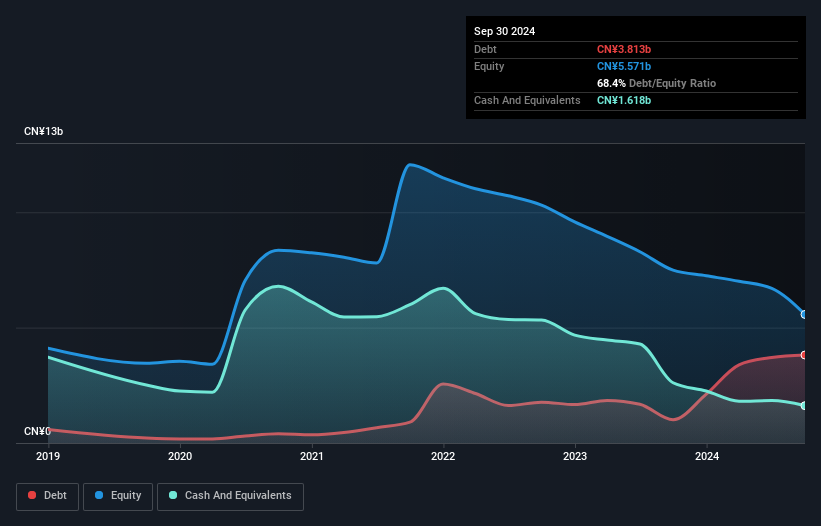Legendary fund manager Li Lu (who Charlie Munger backed) once said, 'The biggest investment risk is not the volatility of prices, but whether you will suffer a permanent loss of capital.' It's only natural to consider a company's balance sheet when you examine how risky it is, since debt is often involved when a business collapses. We note that Kingsoft Cloud Holdings Limited (NASDAQ:KC) does have debt on its balance sheet. But is this debt a concern to shareholders?
Why Does Debt Bring Risk?
Debt and other liabilities become risky for a business when it cannot easily fulfill those obligations, either with free cash flow or by raising capital at an attractive price. Part and parcel of capitalism is the process of 'creative destruction' where failed businesses are mercilessly liquidated by their bankers. While that is not too common, we often do see indebted companies permanently diluting shareholders because lenders force them to raise capital at a distressed price. Of course, plenty of companies use debt to fund growth, without any negative consequences. When we think about a company's use of debt, we first look at cash and debt together.
See our latest analysis for Kingsoft Cloud Holdings
How Much Debt Does Kingsoft Cloud Holdings Carry?
You can click the graphic below for the historical numbers, but it shows that as of September 2024 Kingsoft Cloud Holdings had CN¥3.81b of debt, an increase on CN¥1.01b, over one year. However, it also had CN¥1.62b in cash, and so its net debt is CN¥2.20b.

How Strong Is Kingsoft Cloud Holdings' Balance Sheet?
The latest balance sheet data shows that Kingsoft Cloud Holdings had liabilities of CN¥9.07b due within a year, and liabilities of CN¥2.05b falling due after that. On the other hand, it had cash of CN¥1.62b and CN¥2.02b worth of receivables due within a year. So it has liabilities totalling CN¥7.48b more than its cash and near-term receivables, combined.
This deficit isn't so bad because Kingsoft Cloud Holdings is worth CN¥21.1b, and thus could probably raise enough capital to shore up its balance sheet, if the need arose. But we definitely want to keep our eyes open to indications that its debt is bringing too much risk. When analysing debt levels, the balance sheet is the obvious place to start. But ultimately the future profitability of the business will decide if Kingsoft Cloud Holdings can strengthen its balance sheet over time. So if you want to see what the professionals think, you might find this free report on analyst profit forecasts to be interesting.
In the last year Kingsoft Cloud Holdings had a loss before interest and tax, and actually shrunk its revenue by 2.4%, to CN¥7.3b. We would much prefer see growth.
Caveat Emptor
Over the last twelve months Kingsoft Cloud Holdings produced an earnings before interest and tax (EBIT) loss. Indeed, it lost CN¥1.1b at the EBIT level. Considering that alongside the liabilities mentioned above does not give us much confidence that company should be using so much debt. So we think its balance sheet is a little strained, though not beyond repair. However, it doesn't help that it burned through CN¥1.9b of cash over the last year. So in short it's a really risky stock. When analysing debt levels, the balance sheet is the obvious place to start. But ultimately, every company can contain risks that exist outside of the balance sheet. For example Kingsoft Cloud Holdings has 3 warning signs (and 1 which is significant) we think you should know about.
At the end of the day, it's often better to focus on companies that are free from net debt. You can access our special list of such companies (all with a track record of profit growth). It's free.
Valuation is complex, but we're here to simplify it.
Discover if Kingsoft Cloud Holdings might be undervalued or overvalued with our detailed analysis, featuring fair value estimates, potential risks, dividends, insider trades, and its financial condition.
Access Free AnalysisHave feedback on this article? Concerned about the content? Get in touch with us directly. Alternatively, email editorial-team (at) simplywallst.com.
This article by Simply Wall St is general in nature. We provide commentary based on historical data and analyst forecasts only using an unbiased methodology and our articles are not intended to be financial advice. It does not constitute a recommendation to buy or sell any stock, and does not take account of your objectives, or your financial situation. We aim to bring you long-term focused analysis driven by fundamental data. Note that our analysis may not factor in the latest price-sensitive company announcements or qualitative material. Simply Wall St has no position in any stocks mentioned.
About NasdaqGS:KC
Kingsoft Cloud Holdings
Provides cloud services to businesses and organizations primarily in China.
Undervalued with imperfect balance sheet.
Market Insights
Community Narratives



